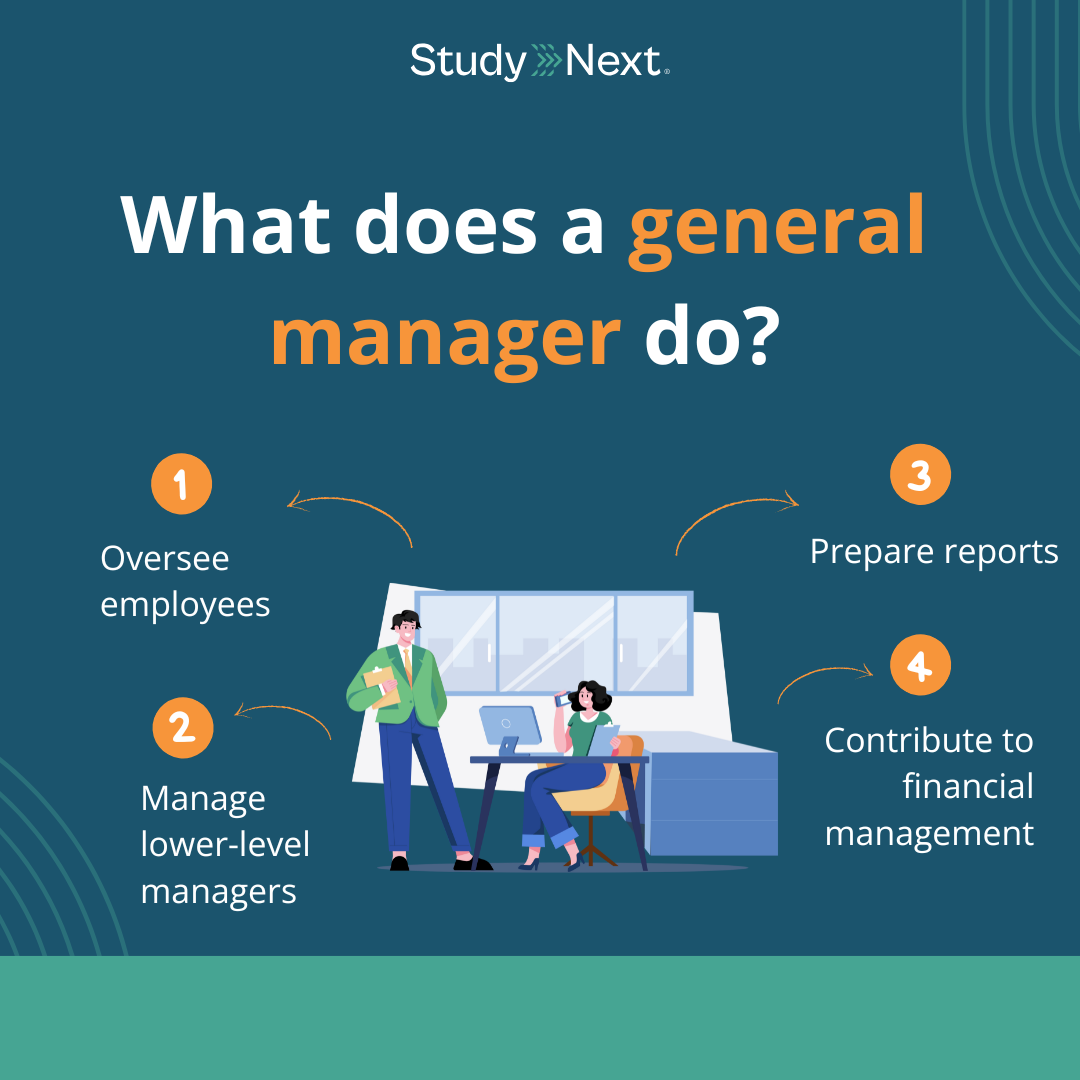In This Article
- Managing director vs general manager: roles and responsibilities
- Managing director vs general manager: salary
- Managing director and general manager qualifications
- Should I become a managing director or a general manager?
- Key differences between a managing director and a general manager
- Discover postgraduate business courses

While managing director and general manager are senior-level positions that require strong leadership and business acumen, their scope of responsibilities and authority differ. Learn more about the key differences between these two roles to help you understand which career path suits your long-term professional goals.
Managing director vs general manager: roles and responsibilities
What does a managing director do?
A managing director typically oversees an organisation’s long-term business strategies and ensures all departments are aligned with company goals. They usually engage with high-profile stakeholders and frequently report to a chief operating officer (CEO) or a board of directors, providing updates on company performance, budgets and growth initiatives that can boost the organisation’s impact.
Key responsibilities of a managing director

Prepare and execute business strategies
Managing directors actively shape the strategic direction of an organisation. They usually oversee various business areas and develop plans to enhance efficiency. For example, they may develop strategies to ensure seamless business acquisitions. They may also examine the performance of their company’s products and services to determine if resources are used effectively. These areas align with the broader business objectives, ultimately driving company revenue and growth.
Develop company policies
These leadership professionals play a vital role in building a safe and ethical workplace while ensuring the organisation is compliant with all relevant regulations. They may work together with HR, managers and other administrative professionals to craft company-wide policies on various areas, including code of conduct, diversity, equality and inclusion as well as occupational health and safety standards.
Manage financial performance
Financial management is a key area of responsibility for managing directors. They closely monitor financial performance to forecast profits, manage expenditures and cut costs if they identify overspending. When developing financial strategies, they consider various investment choices, such as how much to allocate for department budgets, which technological resources to purchase or whether the workspace requires expansion.
Join industry events as the company representative
Boosting brand awareness is a powerful way for businesses to improve organisational performance. Managing directors can raise their company’s profile by attending industry events and networking with other leadership professionals. These connections can lead to valuable partnerships and business opportunities. Speaking at public events can also bring media coverage, which may expose their business to a wider audience and connect them with potential customers or clients.
What does a general manager do?
A general manager is usually responsible for various business units and reports to senior leadership. They play a crucial role in coordinating day-to-day operations and management across departments to ensure workflows are efficient and everyone is working towards achieving specific project goals. The scope and authority of a general manager typically vary according to their role, company size and industry. In smaller businesses, they may act as a top-ranking executive.
Key responsibilities of a general manager

Oversee employees
General managers play a big role in leading and inspiring staff members to keep them motivated and engaged to perform their best at work. This usually involves proper and fair work delegation, providing necessary training and ensuring they are aligned with the company’s operational goals. With effective leadership, general managers can enhance team morale which encourages higher productivity, leading to a better overall performance.
Manage lower-level managers
In this role, general managers often collaborate with lower-level managers. They may get their insights on various matters, such as operational methods, equipment requirements and human resource needs, to improve workflows. General managers may provide information from higher-ups to lower-level managers to keep them aligned with organisational objectives. They also usually supervise the recruiting, hiring and training procedures of their subordinates.
Prepare reports
One of the core general manager responsibilities is to create reports that can help them or the senior management team to make better-informed decisions. These reports often cover various areas, such as the company’s financial performance over a specific period, the progress and effectiveness of strategic organisational plans and operational areas for improvement within business units. The insights from these reports help senior leaders assess whether business operations and performance are meeting organisational goals.
Contribute to financial management
General managers play a vital role in financial management by reviewing the revenue of products and services to identify any unnecessary costs. This may involve examining balance sheets and cash flow statements and comparing them with historical financial trends to find areas for improvement. They may also develop and track budgets for expenses such as staffing, production, equipment and marketing.
Managing director vs general manager: salary
Managing director salary
According to SEEK, managing directors in Australia earn an average annual salary ranging from $225,000 to $245,000. With a projected growth rate of 4.6 per cent in the next five years, this role continues to be in strong demand, reflecting the need for leaders who can guide an organisation’s strategic direction in today’s competitive business landscape.
The income of a managing director can also vary depending on their level of experience and where they choose to work. For example, managing directors working in Queensland earn an average of $225,000, while those in Victoria typically earn $247,000 per year.
General manager salary
General managers typically earn between $150,000 and $170,000 per year. Job opportunities are expected to grow by 9.6 per cent, providing a promising path for professionals across diverse industries to move up in their careers into this management role.
Besides years of work experience, location also plays a factor in determining a general manager’s salary. Explore their average salaries across Australia’s states and territories:
- Queensland: $168,000
- Australian Capital Territory: $167,000
- Victoria: $163,000
- Western Australia: $156,000
- New South Wales: $150,000
- South Australia: $148,000
- Northern Territory: $147,000
- Tasmania: $145,000
Managing director and general manager qualifications
What qualifications does a managing director need?
Obtaining a bachelor’s degree is typically the starting point for a business professional to start their career, often in a field like business, business administration or commerce. Studying in one of these fields equips you with essential knowledge of how businesses operate, diving into areas like finance, sales and marketing, economics and business law. This undergraduate qualification is also a general requirement for many business roles when you enter the job market.
When it comes to landing a managing director role, employers place a strong emphasis on extensive practical experience. According to job listings on Indeed, candidates usually need seven to 12 years of relevant industry experience to be considered. Over the course of your career, you’ll most likely be taking on a variety of roles that help develop your business acumen, decision-making abilities and leadership skills. These capabilities are also often transferable, opening doors to exciting career opportunities across multiple sectors.
Besides gaining work experience, you can also improve your career prospects by advancing your qualifications with postgraduate studies. Not only will you enhance your existing business expertise, but the qualification can signal to employers your commitment and dedication to professional growth. Pursuing a Master of Business Administration (MBA), for example, can improve your leadership capabilities on top of gaining a well-rounded understanding of key business disciplines.
Many MBAs also offer specialisations and majors that can better align with your career goals. For example, James Cook University (JCU)’s Master of Business Administration allows you to complete a general stream or a major with options like Economic Resilience, Entrepreneurship, Leadership and Project Management. The Master of Business Administration program at Kaplan Business School, on the other hand, offers eight specialisations, including Data-driven Leadership, International Leadership and Health Services Management.
You can find several MBA programs that offer majors or specialisations below.


Enhance your career prospects with JCU’s Master of Business Administration (MBA). Gain an in-depth understanding of sustainable enterprise, corporate strategy, innovation and entrepreneurship. JCU MBA graduates are highly sought after for their ability to analyse current practices and outcomes in a business or organisation and develop innovative methods for enhancing its enterprise and success.
JCU’s Master of Business Administration degree strongly focuses on applying and integrating sustainable economic, social and environmental business performance methods to new or existing business models. You will learn how to evaluate the context of a business or organisation and identify the appropriate performance method/s that will enhance its performance or solve a key issue within the business’s framework. You will study a broad body of theoretical and technical knowledge and gain skills in critically analysing complex contemporary business issues and making effective decisions or recommendations for improvement.
This Master of Business Administration degree has six core subjects covering a broad range of topics and will equip you to work effectively in any field of business. You can specialise in your degree by choosing from several majors, including Leadership, Economic Resilience, Entrepreneurship and Project Management. You can also undertake a research project or a professional internship with one of JCU’s leading industry partners. The research project and internship provide extensive experience to prepare you for your future career and networking opportunities to benefit your professional development.
Advance your business career and develop the skills to lead innovative and sustainable change. JCU MBA graduates are highly valued by employers for their expert knowledge, skills and experience, particularly relevant to the Tropics.


CQUniversity's world-class Master of Business Administration (MBA) is delivered by highly qualified course leaders with real-world business and public sector experience to support your career advancement. You will study contemporary people management and emotional intelligence models to lead with influence and integrity. Designed for emerging and aspiring leaders, this MBA focuses on developing contemporary people management skills with the know-how to tackle the changing landscape of the public sector, not-for-profit, social and ethical purpose organisations.
Develop your skills and knowledge in a broad range of management and leadership responsibilities, in areas such as strategy, marketing, people management, operations management, economic and change management and choose a major to suit your industry or career goals.
Tailor your MBA to align with your industry or career and choose to major in emergency management, forensic analysis, project management or general management.
Through interaction with academics, colleagues and various members of the business community, you will gain different perspectives and approaches to current and emerging business issues. Contextual learning and reflective practice will form the basis for your personal and professional development, ensuring your learning experience is relevant and practical.
An MBA from CQUniversity allows you to advance your management career and become an influential leader in today's fast-paced and ever-changing environment.


The Master of Business Administration (Computing) (with specialisations) from Charles Sturt University combines the latest management theory and practice with preparation for the most highly regarded industry certifications in IT governance, IT quality management, IT service management and project management. This course is part of an articulated program of study. Articulated programs allow you to build on your studies to achieve the right level of qualification for you. Preparation for the world's most in-demand industry computing certifications is included as an integral part of this course. You'll learn from experienced academic staff and industry-based lecturers across the latest industry trends. The course has been developed in consultation with industry professionals, educational experts and Charles Sturt University alums to ensure maximum industry relevance. Charles Sturt University's research strengths underpin this degree and one of our aims is to help you develop your research potential. In your final year, you will undertake a capstone project relevant to your workplace. Upon graduation, you could decide to pursue a PhD.
What qualifications does a general manager need?
A general manager’s career journey usually begins with a bachelor’s qualification that helps them apply for an entry-level business role. You can study a field like business, economics, finance or marketing to gain the essential knowledge and hands-on skills needed to drive business growth. These programs typically delve into key topics such as organisational strategy, cross-cultural management and effective communication, building a strong foundation for a successful leadership career.
You also need a substantial amount of work experience to land a role as a general manager. This typically involves climbing the ladder by taking on various roles that focus on leading people and managing operations. General manager positions usually require five to 10 years of experience, according to job advertisements on Indeed. While deepening your understanding of business and strategic planning, you should also sharpen your leadership and management skills as you progress further in your career to help you take on a senior leadership role with confidence.
Pursuing postgraduate studies is common for many aspiring general managers. Furthering your qualifications can increase your chances of landing a leadership position. An MBA, in particular, can be a great way to build upon your business knowledge while connecting you with a network of industry experts and seasoned academic mentors, which can lead to exciting new opportunities and professional growth.
For example, the University of Canberra’s Master of Business Administration course offers international internship opportunities with the university’s partners in Singapore and China. Meanwhile, the Master of Business Administration (Global) program at Victoria University (VU) can equip students with skills and resources that support leadership and career advancement after graduation, thanks to the university’s partnership with the Institute of Managers and Leaders Australia and New Zealand.
Explore more MBA programs offering exciting professional development opportunities below:


The University of Canberra’s Master of Business Administration (MBA) will provide you with the chance to develop high-level competencies relevant to a variety of different types of enterprises.
The MBA covers all aspects of business administration, including finance, marketing, economics, strategic processes and people management. It culminates in the completion of a research project of your choice. Due to the course’s strong focus on Work Integrated Learning (WIL), you will graduate with an impressive portfolio of international experience, as well as the solid business mindset required to negotiate your way through an assortment of legal, industrial and cultural settings. You will be confident interacting in an increasingly complex business environment.
Study a Master of Business Administration at UC and you will:
- Formulate a marketing strategy, with particular emphasis on the development of product, distribution, promotion, pricing strategies and tactics.
- Understand and apply the basic techniques of corporate finance.
- Demonstrate an understanding of the broad body of knowledge inherent in the process of strategic management.
- Compare and contrast different forms of entrepreneurial theory and thinking in their role for idea and business development in the global economy.
- Demonstrate a critical understanding of fundamental economic theories and learn how best to apply them in practical business situations.


To become a successful leader and manager, you require the knowledge, skills and experience for an international business career. Whether you find yourself living and working in Australia or globally, VU's Master of Business Administration (Global) can give you the edge to succeed in today's international business environment.
Industry experts helped design the MBA (Global). This innovative, applied course has the following features:
- A robust focus on global business issues
- Learning with industry experts through a business internship
- Practical application of knowledge to real-life problems
- Business consulting with real clients
- Career skills development
- Digital and technological expertise acquisition
You will develop 'soft' skills to complement your global business acumen, including communication, influencing, team management and ethical awareness.


The International Master of Business Administration degree will develop your knowledge of the global business environment and enable you to maximise your career development opportunities and employment prospects. You will benefit from a range of experience-based learning opportunities, including overseas study trips and business mentorships with a senior business leader through the Executive Partners Program.
Your studies will focus on international business strategy, international trade, global marketing, and management across cultures – the knowledge you will need to accelerate your career as a business professional in an international context.


The Master of Business Administration focuses on leadership and change, innovation and entrepreneurship, finance, ethical practices and social responsibility. It equips students with the capacity to start new ventures or initiate organisational improvements successfully by building on authentic learning experiences and solutions-driven business scenarios. It provides an excellent opportunity for students to gain holistic management and business knowledge which prepares them for general management roles. The course design also allows the choice of electives to complete a related business specialisation such as supply chain management, project management and human resource management. Through the partnership with the Institute of Managers and Leaders, opportunities exist to participate in industry workshops, business case studies, mentoring and personalised professional development
Should I become a managing director or a general manager?
If you’re interested in overseeing the long-term vision of an organisation, you may be better suited for a managing director role. If you prefer being more hands-on with teams and managing the operational side of business, a general manager career path may be ideal for you.
To help you determine which career path aligns with your aspirations, here are a few key questions to reflect on:
What are your goals?
You should reflect on your long-term professional goals to help you decide between a career as a managing director or a general manager. If you want to have greater authority in shaping the overall direction of a company, a managing director role may be the better fit for you. However, if you’re more interested in leading specific business units towards operational success, then a general manager position may align more closely with your ambition.
What do you want your day-to-day work to look like?
These two leadership roles differ not just in authority, but also in how they operate on a daily basis. Managing directors often have high-level meetings with key stakeholders like a board of directors, shareholders and investors. Their role may also require them to attend public events to represent the company.
On the other hand, general managers work closely with teams. Their daily focus usually involves leading employees directly and ensuring everything is operating efficiently.
If you prefer shaping long-term strategy and overseeing corporate governance, becoming a managing director may fit you better. If you enjoy being more hands-on with day-to-day operations, a general manager career path may suit you more.
What kind of environment do you want to work in?
Managing directors typically work in a corporate office environment. They may also be expected to travel frequently, both domestically and internationally, for work to attend conferences, industry events or meetings with partners and shareholders.
In contrast, the work environment for general managers largely depends on their industry. For example, a hotel general manager is often required to work on-site at the hotel or resort they manage to make sure things are running smoothly. In the logistics sector, a general manager may divide their time between their office and the operational worksite.
Where do your strengths lie?
Managing directors typically oversee the entire organisation, ensuring that all departments are working towards business goals. This role is ideal for you if you enjoy strategic thinking and thrive in high-level business circumstances that come with significant accountability. On the other hand, if your interests lie in hands-on leadership and you enjoy being closer to daily operations and people management, then pursuing a career as a general manager may be more fulfilling.
Which path should you choose?
Ultimately, choosing the right path comes down to the kind of impact you want to make in your role. While both positions require strong leadership, decision-making and communication skills, your ideal fit will depend on how you prefer to lead.
If you’re driven to shape the long-term direction of an organisation from the top, pursuing a career as a managing director may be the right move. However, if you prefer being more hands-on with teams and day-to-day operations within a business, a role as a general manager could be a better fit for your leadership style and career goals.
Key differences between a managing director and a general manager
| Category | Managing director | General manager |
|---|---|---|
| Level of authority | Highest executive role in many organisations and typically reports to a board of directors or CEO. | Typically oversees business units and usually reports to a managing director, CEO or other senior executives. |
| Roles and responsibilities | Oversees company performance, governance and stakeholder engagement. | Manages day-to-day operations and performance across business divisions. |
| Salary | Typically earns $225,000 to $245,000 annually in Australia. | Usually makes between $150,000 and $170,000 per year in Australia. |
| Qualifications | A bachelor’s degree in a business field with 7 to 12 years of industry experience. Often has a postgraduate qualification. | A bachelor’s degree in a business field with 5 to 10 years of practical experience. May have a postgraduate qualification. |
| Work environment | Usually in a corporate office setting and may involve travelling for meetings and industry events. | Often works in an office or worksite, depending on the role, organisation and industry. |
| Skills | Requires strong skills in strategic thinking, leadership, decision-making and stakeholder management to create impactful high-level corporate strategies. | Requires excellent skills in team management, leadership, communication and problem-solving to work with teams closely. |
Discover postgraduate business courses
Managing directors and general managers are crucial roles in the business world. Understanding how these jobs differ can help you make up your mind on how you want to contribute to an organisation’s long-term goals. Stepping into either of these leadership roles also requires you to enhance your professional development. Pursuing postgraduate studies can be a great way to help you build the skills needed to elevate your career. Discover various MBA programs and postgraduate business courses offered by leading universities in Australia.























